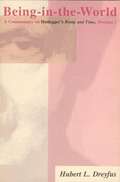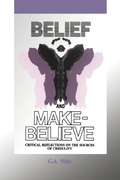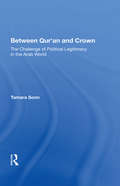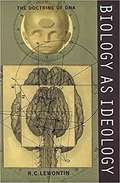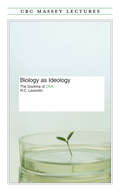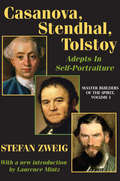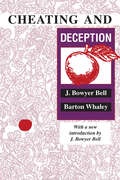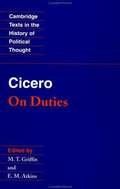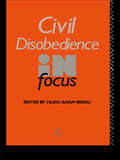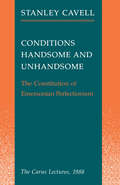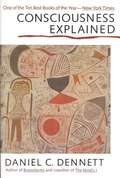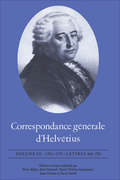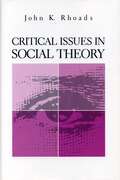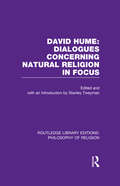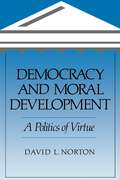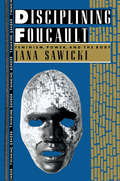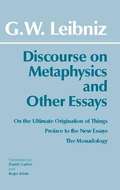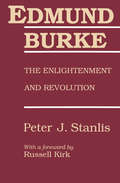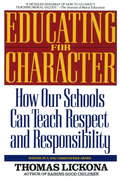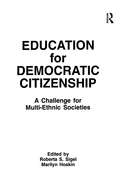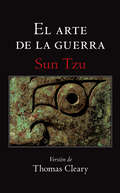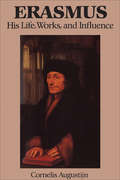- Table View
- List View
Being-in-the-World: A Commentary on Heidegger's Being and Time Division I
by Hubert L. DreyfusDreyfus's approach to this daunting book is straightforward and pragmatic. He explains the text by frequent examples drawn from everyday life, and he skillfully relates Heidegger's ideas to the questions about being and mind that have preoccupied a generation of cognitive scientists and philosophers of mind.
Belief and Make-Believe
by George Albert WellsWhy do so many people - sometimes even intelligent people - swallow the preposterous claims of religion? G.A. Wells, the leading freethinker of our time, tries to shed light on this puzzle in his entertaining and enormously learned book, Belief and Make-Believe.Professor Wells begins by analyzing the nature of belief. To dispel popular confusions on the relation between words and thoughts, he compares the thinking process of scientists, laymen, and chimpanzees.The power of emotion and instinct to help form people's ideological outlooks is analyzed by preference to "defiance" and "reliance", polar attitudes which arise from the need for dominance and submission in primate groups. Wells shows the influence of defiance and reliance in patriotism and in monotheistic religions, where submission to the will of the omnipotent is a wonderful technique for feeling secure in the face of life's actual and ineradicable dangers.Since the knowledgeable Christians now accept that the Bible is uneven, unreliable, and sometimes morally abhorrent, and that the New Testament account of the origin of Christianity is mostly legend, various attempts have been made to save something from the debris by selective re-interpretation. Wells evaluates several typical examples, showing how the apologists shrink from the clear implications of their arguments, which would demolish the whole edifice of Christian doctrine.Finally, Professor Wells debunks some of the extravagant and mystical claims that have been made for the arts, notably poetry, as quasi-religious vehicles for gaining insights into the human condition.
Between Qur'an And Crown: The Challenge Of Political Legitimacy In The Arab World
by Tamara SonnThe struggle for political legitimacy in many Middle Eastern countries today poses a dilemma for ruling elites. In order to maintain authority, leaders often must capitulate to Islamic universalist dogma, which may conflict with their own views of the state as well as threaten the legitimacy of other leaders in the region who are attempting to establish a secular, national basis for government. Tracing the roots of this dilemma in Middle Eastern history and Islamic philosophy, Dr. Sonn compares the contemporary Middle Eastern period to Europe’s “Age of Religious Wars†that preceded the emergence of the Western secular state. She describes how a process similar to the organic development of the secular state in Europe was interrupted in the Middle East by oppressive Western colonialism, which eventually led to the Muslim rejection of nationalism and all things “Western†and to the reassertion of Islam as the sole source of political legitimacy. The author shows how the philosophy of Islamic traditionalism opposes the two fundamentals of stable national political systems—a geographical limitation of authority and an institutionalized process for regular changes in leadership. Dr. Sonn bases her argument on an insightful examination of Middle Eastern history, from the formation and disintegration of the Ottoman Empire in the late nineteenth century to the present, and caps it with a detailed look at a possible solution to the dilemma: the teachings of modern scholars who advocate a new “Islamic realism†incorporating a limited definition of national identity and interests while retaining Islamic social goals.
Biology As Ideology: The Doctrine Of DNA
by Richard C. LewontinFollowing in the fashion of Stephen Jay Gould and Peter Medawar, one of the world's leading scientists examines how "pure science" is in fact shaped and guided by social and political needs and assumptions.
Biology As Ideology: The Doctrine of DNA (The CBC Massey Lectures)
by Richard LewontinR. C. Lewontin is a prominent scientist -- a geneticist who teaches at Harvard -- yet he believes that we have placed science on a pedestal, treating it as an objective body of knowledge that transcends all other ways of knowing and all other endeavours.Lewontin writes in this collection of essays, which began their life as CBC Radio's Massey Lectures Series for 1990: "Scientists do not begin life as scientists, after all, but as social beings immersed in a family, a state, a productive structure, and they view nature through a lens that has been molded by their social experience… . Science, like the Church before it, is a supremely social institution, reflecting and reinforcing the dominant values and vices of society at each historical epoch."In Biology as Ideology Lewontin examines the false paths down which modern scientific ideology has led us. By admitting science's limitations, he helps us rediscover the richness of nature -- and appreciate the real value of science.
Casanova, Stendhal, Tolstoy: Volume 3, Master Builders of the Spirit
by Jay KatzCasanova, Stendhal, Tolstoy: Adepts in Self-Portraiture, the final volume of Stefan Zweig's masterful Master Builders of the Spirit trilogy, discloses the smaller version of a writer's own ego. Unconscious though it is, no reality is as important to the writer as the reality of their own life. Giacomo Casanova, Stendhal (Marie-Henri Beyle), and Leo Tolstoy have different approaches to self-portraiture, but Zweig shows that together they symbolize three levels which represent successively ascending gradations of the same creative function.Casanova is depicted as having a primitive gradation; he simply records deeds and happenings, without any attempt to appraise them or to study the deeper working of the self. Stendhal's self-portraiture is depicted as psychological; he observes himself and investigates his own feelings. Tolstoy has the highest level; he describes his own life, records what led him to his own actions, and focuses on self-reflection in a completely unexaggerated manner.At first glance it might seem as if self-portraiture is an artist's easiest task. With no further trouble than a probing of memory and a description of the facts of life, "the truth" is revealed. The history of literature shows that ordinary autobiographers are no more than commonplace witnesses testifying to facts that chance has brought to their knowledge. A practiced artist is needed to discern the innermost happenings of the soul; few who have attempted autobiography have been successful in this difficult task. The present volume expounds the characteristics of these subjectively minded artists, and of autobiography as their typical method of personal expression.
Cheating and Deception
by J. Bowyer BellCheating and deception are terms often used but rarely defined. They summon up unpleasant connotations; even those deeply involved with cheating and deception rationalize why they have been driven to it. Particularly for Americans and much of Western civilization, official cheating, government duplicity, cheating as policy, and conscious, contrived deception, are all unacceptable except as a last resort in response to threat of extinction. As a distasteful tool, deception is rarely used to achieve national interests, unless in relation to the deployment of military force. As an area of study, it has by and large been ignored.Intrigued by attitudes toward cheating and deception, the authors decided to analyze its roots, structure, and process. They asked fundamental questions: are there categories of deception, general steps in the process of deception, and ways to evaluate its results across time and in different modes? The book that results is a typology of kinds of deception, beginning with military deception, but extending into other categories and stages.In his introduction to this new edition, Bell outlines how the book came to be written, describes the mixed emotions toward the subject displayed by govenmental and nongovernmental funding sources, and speculates about its critical and commercial reception. He discusses widespread new interest in the subject, the research that has been undertaken since this book was first published, and its limitations.This book provides a general overview of this complex subject, creating a framework for analysis of specific instances of cheating or deception. It will be of particular interest to political scientists, those interested in military affairs and strategy, and psychologists. The general reader will find the book written with a light touch, drawing examples of cheating and deception in the pursuit of love and money. The specialist reader will be intrigued by its broad-ranging examples drawn from policy and politics,
Cheating and Deception
by Barton Whaley J. Bowyer BellCheating and deception are terms often used but rarely defined. They summon up unpleasant connotations; even those deeply involved with cheating and deception rationalize why they have been driven to it. Particularly for Americans and much of Western civilization, official cheating, government duplicity, cheating as policy, and conscious, contrived deception, are all unacceptable except as a last resort in response to threat of extinction. As a distasteful tool, deception is rarely used to achieve national interests, unless in relation to the deployment of military force. As an area of study, it has by and large been ignored.Intrigued by attitudes toward cheating and deception, the authors decided to analyze its roots, structure, and process. They asked fundamental questions: are there categories of deception, general steps in the process of deception, and ways to evaluate its results across time and in different modes? The book that results is a typology of kinds of deception, beginning with military deception, but extending into other categories and stages.In his introduction to this new edition, Bell outlines how the book came to be written, describes the mixed emotions toward the subject displayed by govenmental and nongovernmental funding sources, and speculates about its critical and commercial reception. He discusses widespread new interest in the subject, the research that has been undertaken since this book was first published, and its limitations.This book provides a general overview of this complex subject, creating a framework for analysis of specific instances of cheating or deception. It will be of particular interest to political scientists, those interested in military affairs and strategy, and psychologists. The general reader will find the book written with a light touch, drawing examples of cheating and deception in the pursuit of love and money. The specialist reader will be intrigued by its broad-ranging examples drawn from policy and politics,
Cicero: On Duties
by Marcus Tullius CiceroDe Officiis (On Duties) was Cicero's last philosophical work. In it he made use of Greek thought to formulate the political and ethical values of Roman Republican society as he saw them, revealing incidentally a great deal about actual practice. Writing at a time of political crisis after the assassination of Julius Caesar in 44BC, when it was not clear how much of the old Republican order would survive, Cicero here handed on the insights of an elder statesman, adept at political theory and practice, to his son, and through him, to the younger generation in general. De Officiis has often been treated merely as a key to the lost Greek works that Cicero used. This volume aims to render De Officiis, which was such an important influence on later masterpieces of Western political thought, more intelligible by explaining its relation to its own time and place. A wholly new translation is accompanied by a lucid introduction and all the standard features of Cambridge Texts in the History of Political Thought, including a chronology, select bibliography, and notes on the vocabulary and significant individuals mentioned in the text.
Civil Disobedience in Focus (Philosophers in Focus)
by Hugo Adam BedauThe issues surrounding civil disobedience have been discussed since at least 399 BC and, in the wake of such recent events as the protest at Tiananmen Square, are still of great relevance. By presenting classic and current philosophical reflections on the issues, this book presents all the basic materials needed for a philosophical assessment of the nature and justification of civil disobedience. The pieces included range from classic essays by leading contemporary thinkers such as Rawls, Raz and Singer. Hugo Adam Bedau's introduction sets out the issues and shows how the various authors shed light on each aspect of them.
Conditions Handsome and Unhandsome: The Carus Lectures, 1988
by Stanley CavellIn these three lectures, Cavell situates Emerson at an intersection of three crossroads: a place where both philosophy and literature pass; where the two traditions of English and German philosophy shun one another; where the cultures of America and Europe unsettle one another. "Cavell's 'readings' of Wittgenstein and Heidegger and Emerson and other thinkers surely deepen our understanding of them, but they do much more: they offer a vision of what life can be and what culture can mean. . . . These profound lectures are a wonderful place to make [Cavell's] acquaintance."—Hilary Putnam
Consciousness Explained
by Daniel Clement Dennett"Consciousness" is notoriously difficult to explain. On one hand, there are facts about conscious experience -- the way clarinets sound, the way lemonade tastes -- that we know subjectively, from the inside. On the other hand, such facts are not readily accommodated in the objective world described by science. How, after all, could the reediness of clarinets or the tartness of lemonade be predicted in advance? Central to Daniel C. Dennett's attempt to resolve this dilemma is the "heterophenomenological" method, which treats reports of introspection non-traditionally -- not as evidence to be used in explaining consciousness, but as data to be explained. Using this method, Dennett argues against the myth of the Cartesian theater -- the idea that consciousness can be precisely located in space or in time. To replace the Cartesian theater, he introduces his own multiple drafts model of consciousness, in which the mind is a bubbling congeries of unsupervised parallel processing. Finally, Dennett tackles the conventional philosophical questions about consciousness, taking issue not only with the traditional answers but also with the traditional methodology by which they were reached. Dennett's writing, while always serious, is never solemn; who would have thought that combining philosophy, psychology, and neuroscience could be such fun? Not every reader will be convinced that Dennett has succeeded in explaining consciousness; many will feel that his account fails to capture essential features of conscious experience. But none will want to deny that the attempt was well worth making.
Correspondance générale d'Helvétius, Volume III: 1761-1774 / Lettres 465-720
by David Smith Alan Dainard Claude Adrien Helvétius Jean Orsoni Peter Allan Marie-Thérèse InguenaudThe first two volumes of the Correspondance générale d'Helvétius inspired international acclaim. Now the third volume offers us further insight into a variety of aspects of life in eighteenth-century France.Claude-Adrian Helvétius (1715-71) was a wealthy and high-ranking member of French society. He was acquainted with the leading political and social figures of his time and, through family, with the court and government which he occasionally served in a diplomatic capacity. Philosopher, encyclopedist, and author of the explosive De l'Esprit, he and his wife, Anne Catherine de Ligneville, corresponded with the great and influential throughout Europe.The letters in this volume were written between 1761 and 1774, a period in which Helvétius enjoyed the fruits of his fame, travelled to England (1764) and Prussia (1765), and produced two books, Le Bonheur and De l'homme, which were published after his death.
Critical Issues in Social Theory (G - Reference, Information and Interdisciplinary Subjects)
by John Kenneth RhoadsCritical Issues in Social Theory is an analytical survey of persistent controversies that have shaped the field of sociology. It defines, clarifies, and proposes solutions to these "critical issues" through commentary on the writings of such influential social theorists as Hobbes, Marx, Durkheim, Weber, Mead, Merton, Parsons, and Schutz.Instead of being just another history, or another classification of theories, Rhoads's four-part model allows him to focus attention on issues that remain at the core of sociological theory today. First, Rhoads analyzes the controversy over positivism as the proper methodological model for the study of human society. Is there one science, of which sociology is a branch, or do the peculiarities of sociology's subject matter require a modification of the scientific method borrowed from the natural sciences? Rhoads next considers the relationship of individuals to society and its structures. Does society have a mode of existence distinct from its members, or is it merely an abstraction derived from the characteristics of individuals? Third, a discussion of social order raises the question of whether social order is the consequence of rules and their underlying moral values, or the product of continuous construction based on self-interest. Finally, the relative importance of consensus and conflict in social relationships is addressed. Is society better understood as a community united by beliefs, values, and rules, or is the social dynamic of continual conflict over beliefs, values, and rules more fundamental? In coming to grips with these issues, the author in some instances takes sides and in others arrives at a synthesis of diverse perspectives. In the final chapter he points to the limitations on the possibility of rational action that come to light in the clashes over these basic issues.
David Hume: Dialogues Concerning Natural Religion In Focus (Routledge Library Editions: Philosophy of Religion)
by Stanley TweymanBased on the original handwritten manuscript, this book provides a new, accurate edition of Hume’s important work, faithful to his original text, marginal notes, and changes. Stanley Tweyman’s comprehensive introduction gives an interpretation of the Dialogues as a whole, as well as close analysis of each of the work’s twelve parts. Hume’s views on evil are discussed in four previously published articles, and the volume concludes with an extensive bibliography. Originally published in 1991.
Democracy and Moral Development: A Politics of Virtue
by David L. NortonAt a time when politics and virtue seem less compatible than oil and water, Democracy and Moral Development shows how to bring the two together. Philosopher David Norton applies classical concepts of virtue to the premises of modern democracy. The centerpiece of the book is a model of organizational management applicable to the state, business, the professions, and voluntary communities.
Disciplining Foucault: Feminism, Power, and the Body (Thinking Gender)
by Jana SawickiIn this book, the author attempts to integrate previous work on Foucault with feminist theory. She expands discussion of feminism and sexual liberation, charts the impact of Foucault on humanistic studies, and picks up an aspect of the mothering theme, the question of new reproductive technologies.
Discourse on Metaphysics and Other Essays
by Roger Ariew Gottfried Wilhelm Leibniz Daniel GarberDiscourse on Metaphysics and Other Essays contains complete translations of the two essays that constitute the best introduction to Leibniz's complete thought: 'Discourse on Metaphysics', a short course in his metaphysics, written in 1686 at the time his mature thought was just crystalising and 'Monadology' of 1714, a summary of Leibniz's mature metaphysics, written late in his long career. These are supplemented with two essays of special interest to the student of modern philosophy, 'On the Ultimate Origination of Things' of 1697, which deals clearly with Leibniz's celebrated doctrine of contingency and creation, and the Preface to his New Essays of 1703-1705, which presents a brief and coherent overview of his epistemological position, particularly as it relates to the empiricism of Locke.
Edmund Burke: The Enlightenment and Revolution (The Library of Conservative Thought #Vol. 1)
by Peter J. StanlisTwo centuries after Edmund Burke published his Reflections on the Revolution in France, his name and reputation stand alongside Locke, Montesquieu, and Hume - the other still-cited grand political thinkers of the eighteenth century. For those great nations that have fallen into what Burke called "the antagonist world of madness, discord, vice, confusion and unavailing sorrow," the work of Burke supplies that sense of order, justice and freedom the present age seems to require.This volume by Peter Stanlis has grown out of almost four decades of studying Burke. Today, Professor Stanlis is called by Russell Kirk "the leading American authority on the political thought of the great conservative reformer." The book is divided into three categories: Burke on law and politics; Burke's criticism of Enlightenment rationalism and sensibility; and Burke's theory of revolution and critique of the English revolution of 1688.Stanlis' reasons' for linking Burke to the English Revolution rather than the later, and admittedly more decisive American and French Revolutions of his own time, is that for Burke, that earlier event was the normative pivot for judging how to make important changes in civil society. Indeed, even in his writings on the contemporary revolutions of his time,. Stanlis reminds us that Burke interpreted revolutionary events in France and Americas through the prism of the bloodless Revolution of 1688.
Educating for Character: How Our Schools Can Teach Respect and Responsibility
by Thomas LickonaCalls for renewed moral education in America's schools, offering dozens of programs schools can adopt to teach students respect, responsibility, hard work, and other values that should not be left to parents to teach.
Education for Democratic Citizenship: A Challenge for Multi-ethnic Societies
by Roberta S. Sigel Marilyn HoskinIt is becoming increasingly clear that members of a host nation as well as newcomers have to learn what it means to live democratically in a multi-ethnic world and to accept diversity without fear or rancor. This volume, a result of a conference sponsored by the Spencer Foundation, asks a question of increasing significance in view of post World War II immigration patterns and the spread of democratic forms of government: "What can educational researchers and practitioners do to prepare our youth for cooperative, constructive living in a democracy?" This book illustrates how six post-industrial nations -- Canada, Germany, Israel, The Netherlands, the United Kingdom, and the United States -- have met or failed to meet this challenge.
El arte de la guerra (Clásicos Ilustrados Ser. #Vol. 1)
by Sun Tzu Thomas ClearyRecopilado más de dos mil años atrás por un misterioso guerrero filósofo, El arte de la guerra sigue siendo, quizás, hoy en día, el libro de estrategia más prestigioso e influyente del mundo, estudiado en Asia por políticos modernos y ejecutivos con el mismo entusiasmo con el que fuera consultado en tiempos antiguos por jefes militares. Como estudio de la anatomía de las organizaciones en conflicto, El arte de la guerra se aplica en general a la competencia y al conflicto, en todo nivel, desde el interpersonal al internacional. Su objetivo es la invencibilidad, la victoria sin dar batalla, y la fuerza inexpugnable gracias a la comprensión de la física, la política y la psicología del conflicto. Compiled more than two thousand years ago by a mysterious warrior-philosopher, The Art of War is still perhaps the most prestigious and influential book of strategy in the world today, as eagerly studied in Asia by modern politicians and executives as it has been by military leaders since ancient times. As a study of the anatomy of organizations in conflict, The Art of War applies to competition and conflict in general, on every level from the interpersonal to the international. Its aim is invincibility, victory without battle, and unassailable strength through understanding of the physics, politics, and psychology of conflict.
Elements of the Philosophy of Right
by Georg Wilhelm Friedrich HegelThis book is a translation of a classic work of modern social and political thought. Elements of the Philosophy of Right, Hegel's last major published work, is an attempt to systematize ethical theory, natural right, the philosophy of law, political theory, and the sociology of the modern state into the framework of Hegel's philosophy of history. Hegel's work has been interpreted in radically different ways, influencing many political movements from far right to far left, and is widely perceived as central to the communitarian tradition in modern ethical, social, and political thought. This edition includes extensive editorial material informing the reader of the historical background of Hegel's text, and explaining his allusions to Roman law and other sources, making use of lecture materials which have only recently become available. The new translation is literal, readable, and consistent, and will be informative and scholarly enough to serve the needs of students and specialists alike.
Empiricism and Subjectivity: An Essay on Hume's Theory of Human Nature
by Gilles DeleuzeThis essential reading is the foundation for Deleuze's later work and an invaluable resource for understanding the emergence and progress of his thought from Hume to Kant and then to Nietzsche. Deleuze also offers a crucial contribution to the debate about the vanishing subject, profoundly influencing the discussion of his theory of difference.
Erasmus: His Life, Works, and Influence
by Cornelis Augustijn J. C. GraysonErasmus: His Life, Works, and Influence is a comprehensive introduction to Erasmus's life, works, and thoughts. It integrates the best scholarship of the past twenty years and will appeal to undergraduates in all areas of cultural history as well as Erasmus specialists.
